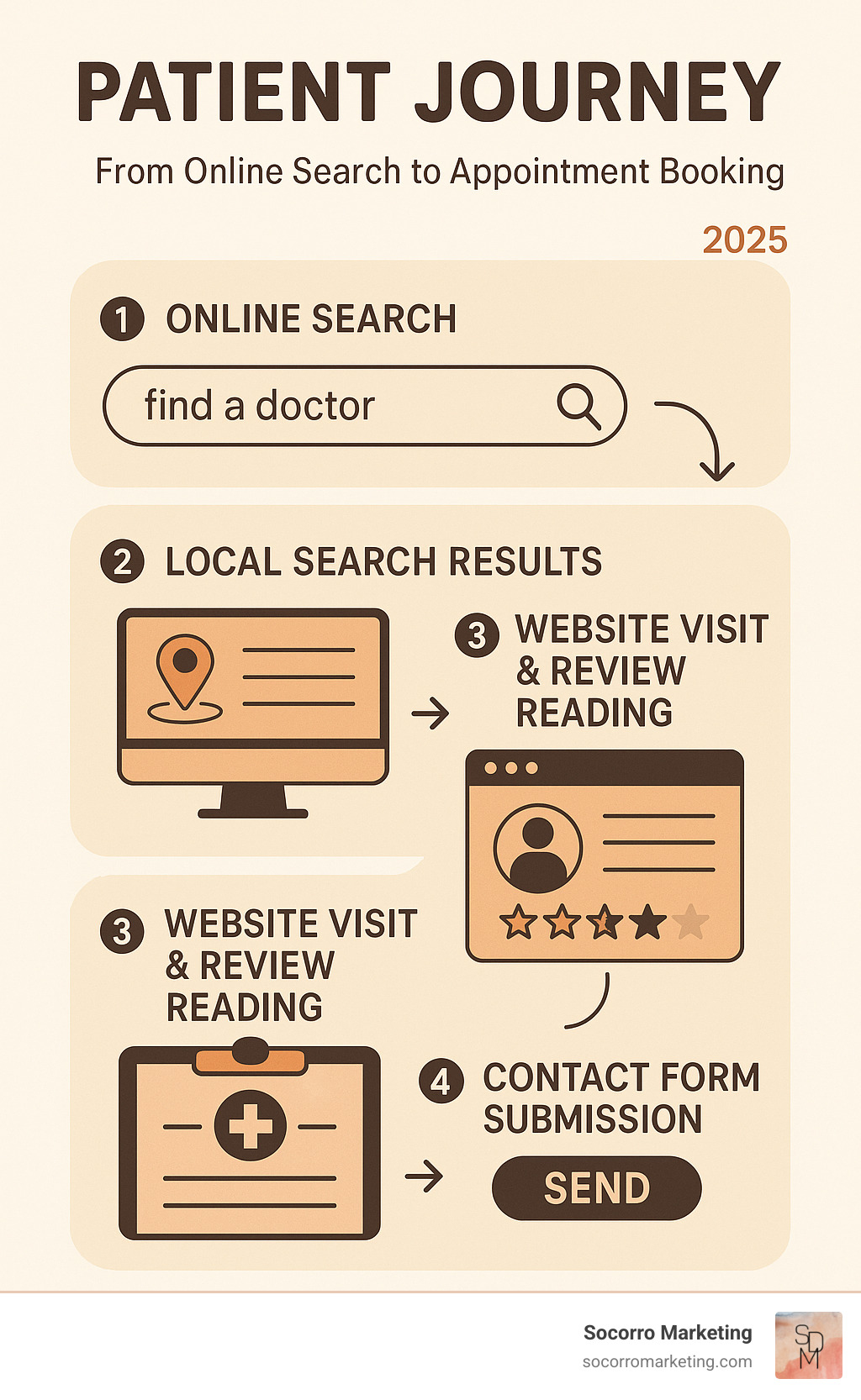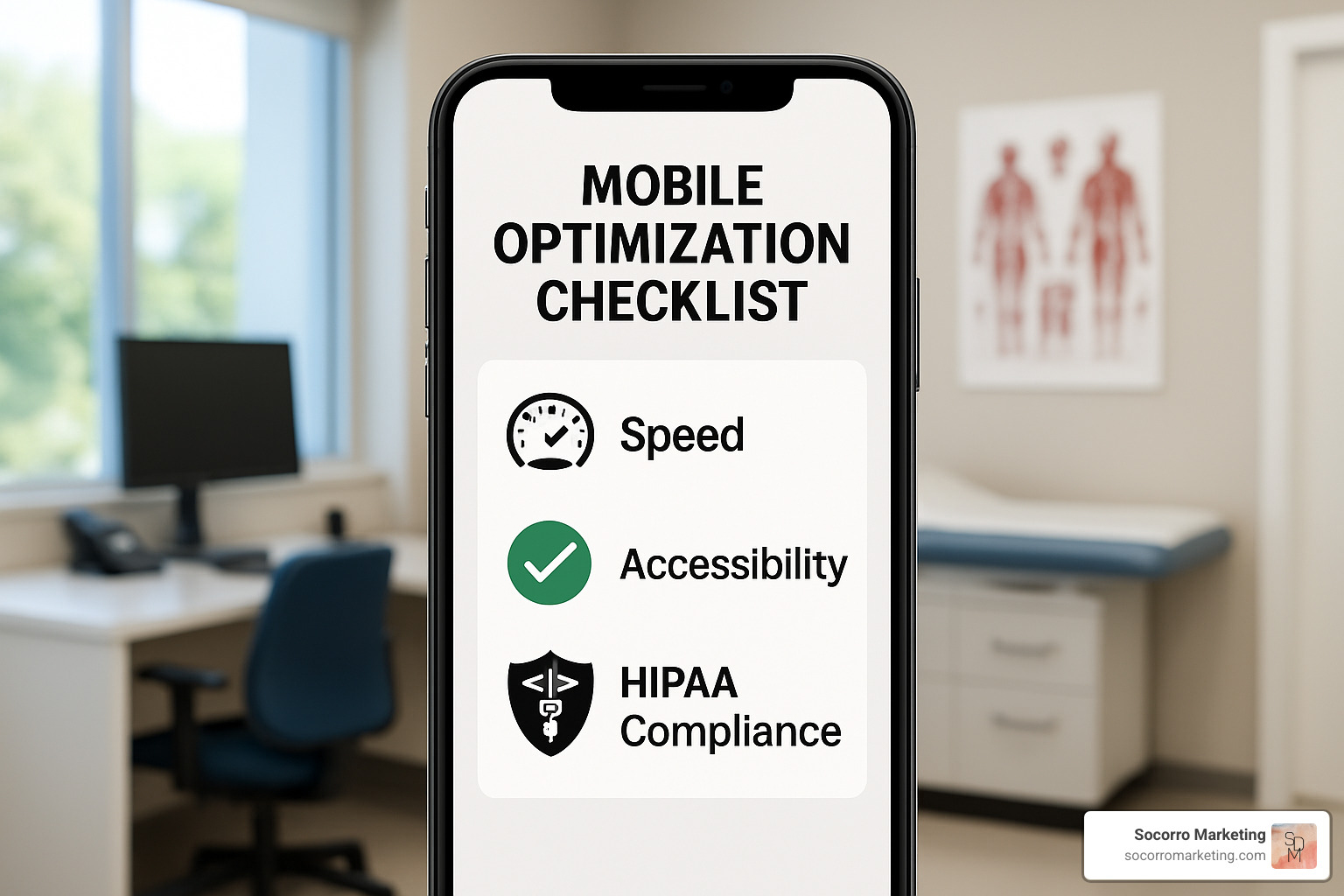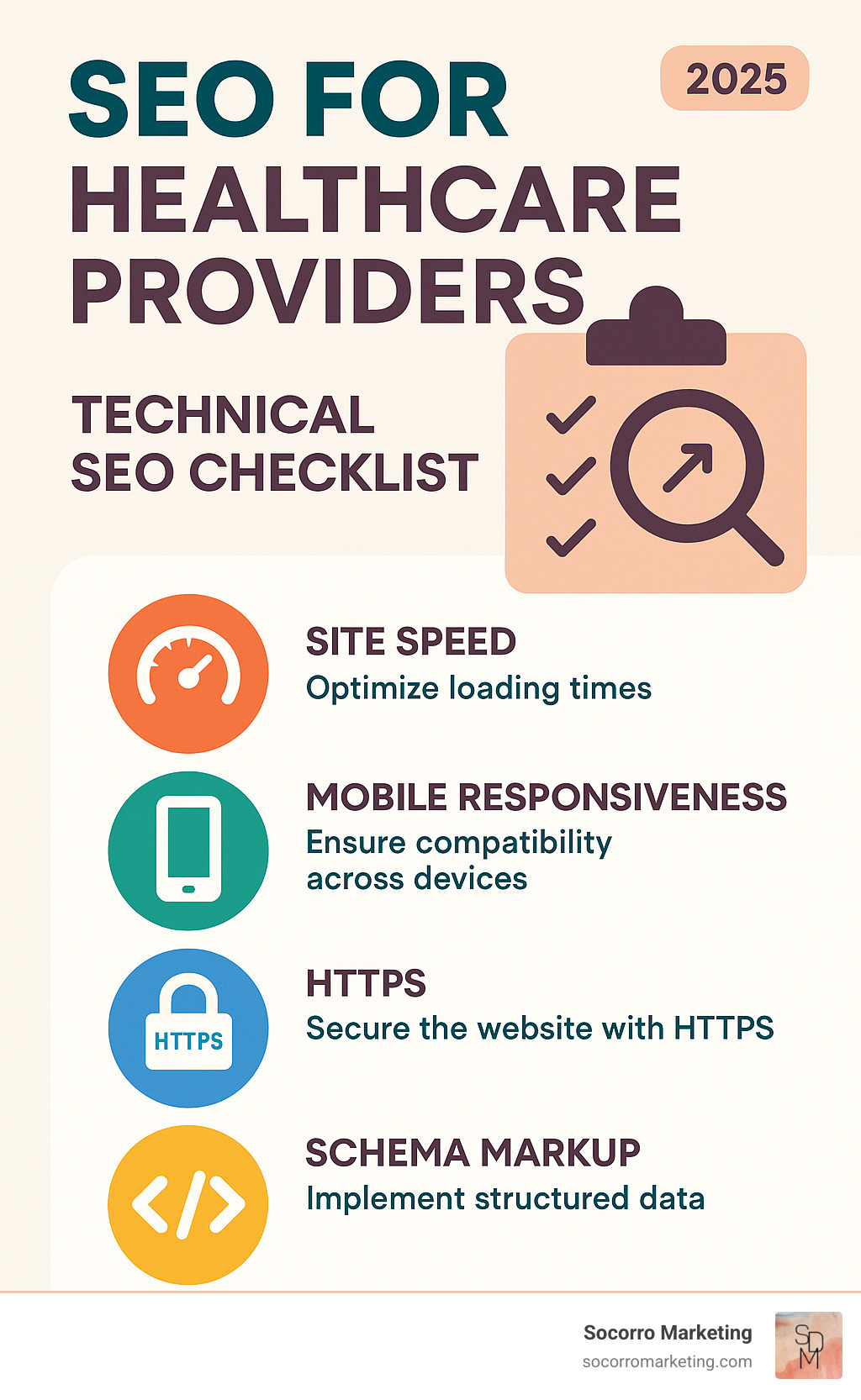SEO for healthcare providers is the practice of optimizing medical websites to rank higher in search results, helping patients find and choose your practice over competitors. With over 70,000 healthcare searches happening every minute on Google, your online visibility directly impacts patient acquisition and practice growth.
Key Components of Healthcare SEO:
The stakes are higher in healthcare than any other industry. 77% of patients use search engines when selecting a hospital, and first impressions matter - the top organic result gets clicked 27.6% of the time.
Unlike traditional advertising, SEO builds lasting value. Online search drives up to 3x more visitors to hospital sites than other marketing channels. While a billboard disappears when you stop paying, a well-optimized website continues attracting patients 24/7.
I'm Grace Ascione, a registered nurse with an MBA who has spent 15 years helping healthcare businesses improve their digital presence and patient acquisition. My clinical background combined with Google Analytics and SEO certifications gives me unique insight into what works for SEO for healthcare providers.

SEO for healthcare providers is your digital front desk - the first impression patients get of your practice. Healthcare SEO makes your medical practice visible online when patients are actively searching for the care you provide.
When someone types "family doctor accepting new patients" into Google at 2 AM, they have a real need, often accompanied by worry or pain. Your visibility in those crucial moments determines whether they choose your practice or scroll past to a competitor.
The patient journey has fundamentally changed. 80% of US adults conducted a healthcare-related search in the last year. Latest data on patient search behavior reveals that patients follow a predictable path: symptom searches, provider research, review reading, then appointment booking.
71% of patients find a new doctor by researching online reviews, and 64% of patients book appointments through a practice's website. Your online presence isn't just marketing anymore - it's patient care delivery.
Healthcare SEO faces unique challenges requiring specialized knowledge. HIPAA compliance affects every aspect of your online presence. Patient testimonials need careful handling. Contact forms require secure transmission.
Google's E-E-A-T framework scrutinizes medical content more rigorously than other industries. Your website falls under "Your Money or Your Life" topics, meaning search engines hold your content to medical journal standards. 52% of Americans worry about false or misleading health information, so Google takes no chances with healthcare content.
You're competing against WebMD, Mayo Clinic, and medical giants with massive resources. These sites dominate broad medical terms, making it crucial to focus on specific, local, and service-oriented keywords.
SEO for healthcare providers offers advantages traditional marketing can't match. Unlike expensive ads, SEO builds lasting value. A well-optimized page about your diabetes management program attracts patients for years.
High search engine rankings are often equated with trustworthiness in healthcare. When your practice appears at the top of search results, patients associate that visibility with quality care and expertise.
Online search drives up to 3x more visitors to hospital sites compared to other marketing channels. These visitors have high intent - they're actively seeking your services, not passively consuming advertisements.
SEO for healthcare providers requires systematic diagnosis before treatment. Every successful healthcare practice needs a digital strategy that builds trust while helping patients find care.
Patients follow a predictable journey: they start worried about symptoms, research options, then look for nearby providers. Your job is to be there at every step.
Organize content like a medical chart - everything connected and building toward better patient care. A cardiology practice might create a comprehensive "heart disease" hub with supporting pages covering symptoms, treatments, prevention, and physician profiles.
Essential Healthcare SEO Tools:
Healthcare keyword research is like taking patient history - understand exactly what people are saying and feeling. Patients don't search for "cardiology" - they search for "chest pain when exercising" or "heart specialist accepting new patients."
More info about SEO Strategy dives deeper, but here's what works for healthcare practices.
Map patient intent. Informational searches like "what causes lower back pain" come from worried patients seeking answers. Navigational searches like "Denver orthopedic clinic" show readiness to find providers. Transactional searches like "book physical therapy appointment" indicate immediate need.
Google Keyword Planner provides search volume, but check "People also ask" sections for real patient questions. Review patient intake forms to see what brings people to your office.
976 long-tail keywords with manageable competition exist for "headache" alone. You don't need to outrank Mayo Clinic on every term. Find specific problems you solve best and own those searches.
Creating healthcare SEO content requires medical accuracy without textbook language. Patients want understandable, trustworthy information.
Google's E-E-A-T framework matters more for medical content than anywhere else. Scientific research on EEAT principles shows why search engines scrutinize health information carefully.
Experience means sharing real outcomes with patient permission. Expertise requires displaying credentials prominently. Authoritativeness comes from citing reputable sources. Trustworthiness means transparency with clear contact information and professional photos.
Your content creation should mirror clinical care: medical professional creates outline, writer develops patient-friendly draft, medical review for accuracy, SEO optimization, final medical review.
Local SEO for healthcare providers is essential for patient acquisition. 93% of Google searches show the Local Pack in top position, making local optimization crucial.
Your Google Business Profile is often patients' first impression. Step-by-step GBP guide covers basics, but healthcare practices need extra attention.
Complete every profile field. Choose specific categories like "Pediatric Dentist" instead of "Dentist." Upload professional photos of staff, office, and equipment. Post regular updates and respond to all reviews within 48 hours.
NAP citations need perfect consistency across the internet. Audit listings on Google, Bing, Healthgrades, Vitals, and local directories.
Healthcare link-building requires ethical standards matching patient care. Focus on earning links through genuine relationships rather than shortcuts.
Government and educational outreach works naturally. Speak at medical schools, participate in public health initiatives, or contribute to government resources. These .gov and .edu links carry significant authority.
Professional conferences provide excellent opportunities. Speaking or sponsoring events often results in high-quality backlinks from conference websites and medical publications.
Never buy links or participate in schemes. Google's penalties are severe, and healthcare providers can't afford reputation damage.
SEO for healthcare providers requires technical foundations that satisfy search engines while meeting strict compliance requirements. Healthcare websites handle sensitive patient information requiring bulletproof protection.
Getting technical basics right improves both search rankings and patient experience. When your site loads quickly, works on phones, and meets accessibility standards, you create better experiences for patients who need your care.

Someone experiencing chest pain searches "emergency cardiology near me" on their phone. Your practice appears in results, but your website takes 8 seconds to load. They're gone before your page appears, probably booking with a competitor whose site loaded instantly.
Page speed isn't just about rankings - it's about patient care. Google recommends load times under 2 seconds, but for healthcare sites, every millisecond counts.
Core Web Vitals measure real patient experience. Largest Contentful Paint should be under 2.5 seconds, First Input Delay under 100 milliseconds, and Cumulative Layout Shift under 0.1.
Use PageSpeed Insights to identify slowdowns. Common culprits are oversized images, too many plugins, slow servers, and blocking JavaScript. Most healthcare sites improve dramatically by compressing images under 500KB and removing unused plugins.
Over 76% of patients use smartphones for health searches, and 44% of mobile users schedule appointments after finding hospital information online. Phone numbers should be clickable, forms easy to complete, and critical information visible without scrolling.
Healthcare accessibility ensures every patient can access your services. More than 1 in 4 US adults have a disability, making accessibility both regulatory requirement and fundamental patient care.
More info about accessibility provides comprehensive guidance. Alt text for medical images needs to describe meaning, not just content. "Chest X-ray showing clear lungs" provides actual value versus "X-ray image."
Keyboard navigation helps patients who can't use mice. Color contrast ratios meeting WCAG 2.1 AA standards ensure patients with vision impairments can read content. Descriptive link text like "schedule your annual physical exam" instead of "click here" helps screen reader users.
Schema markup gives search engines structured information about your practice. Healthcare providers should implement MedicalOrganization schema for practice details, Physician schema for doctor profiles, and LocalBusiness schema for location information.
The difference schema markup makes:
| Plain HTML Result | Schema-Improved Result |
|---|---|
| Dr. Smith Cardiology | ⭐⭐⭐⭐⭐ Dr. Smith Cardiology |
| 123 Main St | Board-certified cardiologist |
| Basic description | 📞 (555) 123-4567 |
| ⏰ Open until 6 PM |
HTTPS is mandatory for healthcare sites. SSL certificates must be properly configured and renewed annually. Two-factor authentication, regular security updates, HIPAA-compliant hosting, and secure contact forms protect patient information and maintain trust.

SEO for healthcare providers isn't about website visitors - it's about getting the right visitors who become patients. Track metrics that matter to your practice's bottom line, not vanity numbers.
10,000 monthly visitors sounds impressive, but what if none book appointments? 500 visitors resulting in 50 new patients? That's gold.
Focus on organic traffic to service pages rather than blog traffic. Someone reading about seasonal allergies might be interesting, but someone visiting "allergy testing appointments" is ready to become a patient.
Local search performance deserves special attention. Monitor impressions and clicks for "pediatrician near me" or "urgent care downtown." These represent people actively seeking care in your area.
Phone calls from organic search tell powerful stories. Use call tracking to see which SEO efforts drive actual conversations. Many patients, especially older adults, prefer calling over online forms.
Google Analytics 4 helps understand the patient journey. Set up conversion tracking for contact forms, phone clicks, and appointment requests. Patient portal registrations indicate someone planning ongoing care, not one-time visits.
Consider patient lifetime value. If your average patient brings $2,000 over their relationship, and SEO costs $1,500 monthly while attracting 10 new patients, you're seeing incredible ROI.
Managing SEO across multiple locations requires each location to have its own personality while maintaining brand consistency.
Create dedicated pages for each office with unique, helpful content. Don't copy and paste descriptions with different addresses. Discuss specific neighborhoods, nearby landmarks, and specialized services.
Localized URLs like "/locations/denver-office" immediately tell everyone what to expect. Internal linking between locations should feel natural - if someone's viewing your Denver cardiology office but lives closer to Boulder, make it easy to find the right fit.
Different specialties require different keyword strategies. Urgent care focuses on immediate-need terms like "fever treatment tonight." Plastic surgery targets research-focused keywords like "tummy tuck recovery timeline."
Keyword stuffing sounds robotic and hurts rankings. Write naturally, like talking to patients in your office. Thin content that doesn't help patients is worse than no content.
Ignoring negative reviews damages reputation and local rankings. Respond professionally to every review. Outdated medical information is dangerous and terrible for SEO. Set regular review schedules and include publication dates.
Generic content that could describe any practice misses the point of local healthcare SEO. Focusing only on broad keywords while ignoring long-tail searches means missing potential patients. More people search "pediatric dentist who takes Medicaid near downtown" than just "pediatric dentist."
Keep patients at the center of every decision. When creating content or tracking metrics, ask: "Does this help someone get better healthcare?"
Healthcare SEO typically takes 3-6 months to show significant results, but you'll see improvements sooner. SEO is like physical therapy - you might feel better after the first session, but real change happens with consistent effort.
In the first month or two, we'll fix technical issues and optimize your Google Business Profile. You'll notice your practice showing up more in local searches. By months three and four, content starts ranking for less competitive terms. Real momentum builds in months six through twelve with significant organic traffic growth.
After year two and beyond, practices often achieve market leadership. Doctors who started three years ago have massive advantages over those just beginning.
Yes - each location needs its own optimization while keeping brand consistency. Every location requires its own Google Business Profile with unique local phone numbers and addresses. Google treats each location as separate business entities.
Content strategy should reflect local differences. A pediatric practice with downtown Denver and suburban Littleton offices attracts different populations with different concerns. Downtown might focus on working parents needing after-hours care, while suburban emphasizes family-friendly services.
Location-specific service offerings matter. Maybe your main office offers specialized procedures satellites don't provide. These differences should be reflected in your SEO strategy.
HIPAA compliance and SEO work beautifully together when you understand boundaries. Focus on educational content about conditions and treatments rather than specific patient information. You can write extensively about diabetes management or heart disease prevention without mentioning individual patients.
General practice information and credentials are your SEO goldmine. Share medical school background, board certifications, experience, and philosophy. Patients want to know about your expertise, and Google rewards authoritative content.
Anonymized case studies work perfectly with proper permission. Instead of "Mrs. Johnson's knee replacement," write about "a 65-year-old teacher who returned to work six weeks after surgery."
HIPAA compliance actually improves SEO by forcing focus on educational, authoritative content that Google values most.
When I started my healthcare career as a nurse, I never imagined I'd be helping practices steer the digital world. But here's what I've learned: SEO for healthcare providers isn't just about climbing search rankings - it's about being there when someone's child has a fever at midnight, or when chest pain sends someone scrambling for answers.
Those 70,000 healthcare searches happening every minute represent real people with real concerns. They're not looking for the flashiest website or the most expensive ad. They want to find a provider they can trust, someone who understands their needs and can help them feel better.
The challenge is that most healthcare marketing feels like it was designed by people who've never set foot in a medical office. They throw around generic SEO advice that ignores everything that makes healthcare unique - from HIPAA compliance to the life-and-death nature of medical decisions.
That's exactly why we built Socorro Marketing differently. Our nurse-managed approach means we understand both sides of the equation. We know what patients are really searching for, and we know what healthcare providers need to succeed.
Your next steps don't have to be overwhelming. Start by checking your Google Business Profile - is your information accurate? Are you responding to reviews? Then look at your website through a patient's eyes. If you were worried about your health, would this site give you confidence?
Focus on the keywords that matter most to your practice. A pediatrician in Golden, CO doesn't need to rank for "surgery" - but showing up when parents search "pediatrician near me" or "child fever when to worry" can transform your practice.
SEO for healthcare providers is a marathon, not a sprint. The content you create today will keep working for years. The trust you build through helpful, accurate information compounds over time. And the patients you help find you will often become your most loyal advocates.
More info about increasing organic search traffic can help you dive deeper into specific strategies that work for healthcare practices.
At Socorro Marketing, we've seen what happens when healthcare providers get their digital presence right. Practices that were struggling to fill their schedules suddenly have waiting lists. Specialists who were depending on referrals start getting direct patient inquiries. Small practices compete effectively with larger health systems.
We're not just another marketing agency - we're your clinical colleagues who happen to understand digital marketing. From our home base in Golden, CO, we serve healthcare providers across Utah, Arizona, New Mexico, and Colorado. We speak your language because we've lived your challenges.
Your patients are out there searching right now. They need your expertise, your compassion, and your care. Let's make sure they can find you when they need you most. Because at the end of the day, that's what really matters - connecting people with the healthcare they need to live their best lives.